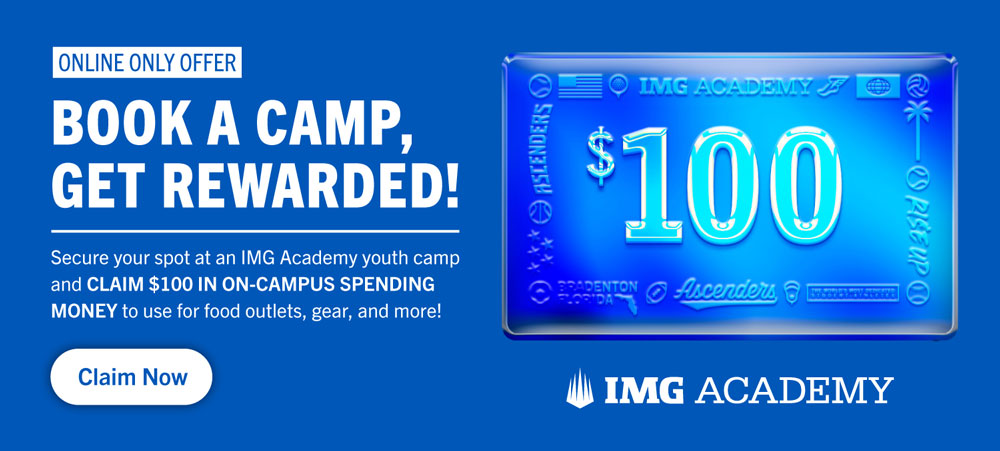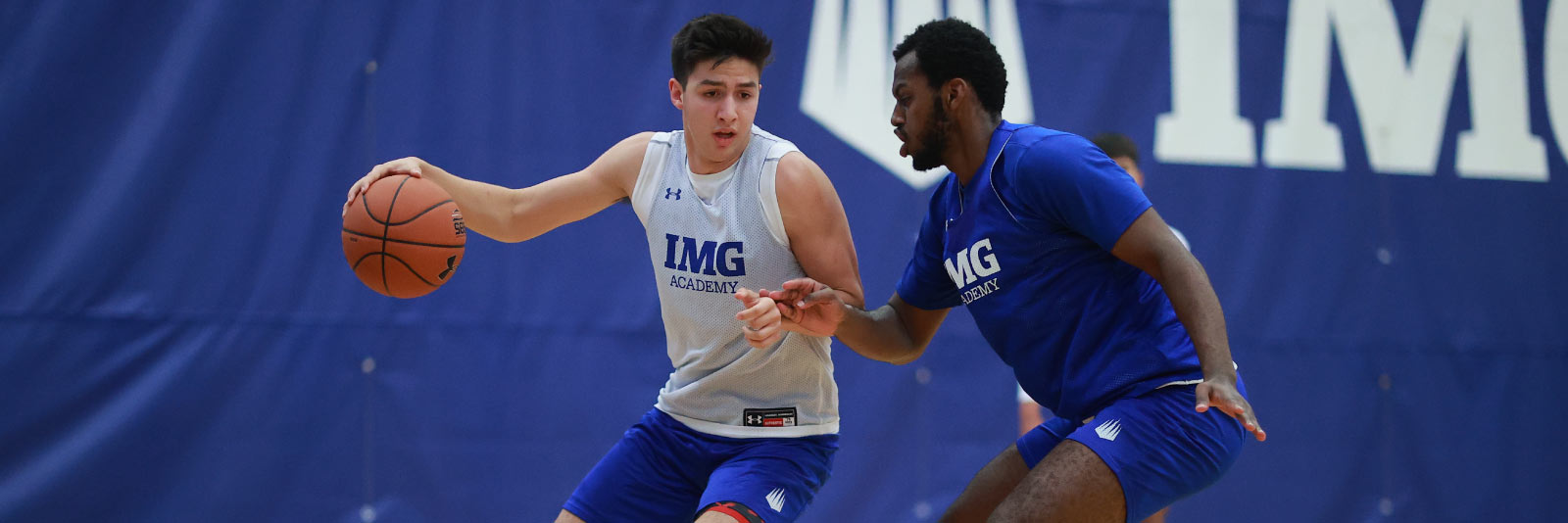Basketball camps are a great way to refine your skills, train with experienced coaches, and even get noticed as a potential recruit. Whether you’re looking to improve your game or take the next step in your recruiting journey, attending the right camp can make all the difference.
Wondering how to find basketball camps near you? NCSA has put together a comprehensive list of college basketball camps across the country. Explore the list below to find camps near you and get answers to top questions about men’s basketball camps.
Search all men’s basketball recruiting events here. Find women’s basketball camps here.
Did you know that college coaches can send you camp invites directly through NCSA? Create an NCSA Recruiting Profile today!
Top questions about basketball camps
- What are the 4 types of basketball camps?
- What are the best basketball camps?
- What are the best basketball exposure camps?
- Are basketball exposure camps worth it?
- Basketball clinics
- What can you expect at men’s basketball camps?
- Do basketball camps really help?
- When should you start going to college basketball camps?
- How do you choose the right basketball camp?
- How do you get invited to camps where college scouts are recruiting?
- How much do basketball camps cost?
What are the 4 types of basketball camps?
Men’s college basketball programs and third-party organizations, like Nike or PGC Basketball, host a variety of camps based on age, skill level and position. There are four main types of basketball camps you can choose to attend.
Basketball training camps
- What is the purpose? Designed for athletes to learn or master the fundamentals of the game.
- Who can attend? 8th – 12th grade. Sessions are based on age, skill level and position.
- Why should you attend? Gain the knowledge and skills needed to take your game to the next level, beginner to elite.

Train like the top basketball players in the country at IMG Academy Basketball Camp. IMG Academy is the largest and most innovative leader in athletic and performance development. Campers have access to the same training methodology as NBA draft selections and top D1 commits.
Specialty camps
- What is the purpose? Designed for athletes to focus on a specific skillset or area of the game. More commonly held as basketball clinics.
- Who can attend? 8th – 12th grade. Sessions are based on age, skill level and position.
- Why should you attend? Learn or master an individual skillset like shooting, ball-handling, defense and rebounding.
College prospect camps
- What is the purpose? Designed for athletes to demonstrate their skills in front of a single college coaching staff on their campus. Also known as basketball elite camps.
- Who can attend? 10th – 12th grade. For elite or varsity level players.
- Why should you attend? To get evaluated as a potential recruit, visit campus and build relationships with the college coaching staff.
Basketball exposure camps
- What is the purpose? Designed to give athletes a platform to showcase skills and gain exposure to multiple college coaches and recruiters. More commonly known as basketball showcases.
- Who can attend? 10th – 12th grade. For elite or varsity level players.
- Why should you attend? To get evaluated by a variety of division levels and college coaches at one time.
What are the best basketball camps?
The best basketball camps will offer you the chance to learn from experienced basketball coaches, develop your skills on the court and compete against elite players. If you’re serious about playing college hoops, check out some of these top-rated basketball camps:
What are the best basketball exposure camps?
The best exposure basketball camps will provide you the opportunity to play in front of D1, D2, D3 and Junior Colleges. Here are the top-rated exposure basketball camps:
Are basketball exposure camps worth it?
Basketball exposure camps are worth attending for athletes who wish to continue playing in college. These events provide a chance to play in front of multiple schools and division levels at one time. These exposure camps can be pricey, so you’ll want to make sure your game is ready to be evaluated by college coaches.
basketball clinics
Basketball clinics are one-day camp sessions that last a few hours. These are tailored towards a specific group of players or skill, like a basketball shooting clinic. If your budget is tight, basketball clinics can be a great option as they are cheaper than most camps. Sometimes, you can find basketball clinics near you put on for free by local schools and professional sports teams!
What can you expect at basketball camps?
Camps are usually multi-day-long affairs that could require an overnight stay, depending on your location.
Each day is broken up by sessions that focus on skills from an area of the game such as dribbling, shooting, passing, ball handling or defense.
Campers will then put their newly learned skills to the test in competitive 1-on-1 or 5-on-5 games. Instructors will also break down the mental aspects of the game or bring in a guest speaker to share their basketball knowledge and experience.
Basketball exposure camps work like showcases. Learn more about basketball showcases and how they can benefit your recruiting.

Do basketball camps really help?
Yes, basketball camps help you develop your offensive and defensive skills. Some camps may focus on a particular area of your game like shooting or ball-handling. Showing a diverse skill set at recruiting events can help increase your chances of getting noticed by college coaches.
When should you start going to college basketball camps?
By your sophomore year, you should be ready to start attending camps with college coaches present.
Consider attending camps that have multiple schools and division levels present to see where you get the most interest from. Keep in mind, you should master the fundamentals before attending these types of camps.
All grade levels should attend skill development camps and specialist camps to improve their overall game. However, upperclassmen should focus more of their time on attending camps during NCAA evaluation periods to get recruiting exposure to college coaches.
How do you choose the right basketball camp?
Research! Look at the camp description and itinerary to determine if your playing ability and objectives fit.
If you’re an NCAA basketball recruit, an elite or advanced level camp may be perfect for you.
If you’re just starting out or looking to develop skills to make the varsity team, you’ll want to search for beginner level camps offered in your age group.
How do you get invited to camps where college scouts are recruiting?
The top exposure camps and showcases require an invite to attend. Basketball recruiters and tournament organizers seek the top high school talent for college coaches to evaluate.
The first step towards scoring an invitation is to excel at the high school level. When the season’s over, join a travel club or AAU team that is known for having top players and competes in big tournaments.
Prospect camps, or elite camps, are intended for coaches to invite their top prospects to campus.
Keep in mind, coaches still need to fill the gym and make a profit from these camps. So, they’ll also send out mass emails and camp invites to their entire list of recruits. These shouldn’t be mistaken for real interest. Know where you stand as a recruit before you go.
How much do basketball camps cost?
Basketball camp fees can range from $100 to over $1,000 for a few days of training. So, the price of attending multiple camps in a year can really add up.
If you find yourself in a position where you can’t afford to attend multiple camps in a year, don’t worry! Here are other ways you can improve your skills to get noticed by college coaches:
- Check out basketball workouts online. You can find a ton of 30 minutes to 1-hour long basketball workouts online and the best part? They’re free!
- Go to a personal basketball trainer. Yes, trainers cost money. But they are a great way to get 1:1 skill instruction and track your progress. Some may argue that personal trainers are better worth your money than attending 10 camps a season.
Conclusion
Basketball camps offer you the opportunity to develop your skillset and gain exposure to college coaches. What camp you choose to attend and when are based on your individual recruiting goals. Create an NCSA Recruiting profile to receive and respond to college camp invites. Start your profile now!
Learn more about the different types of basketball events:
